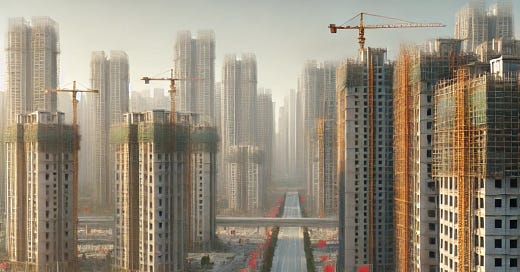China's Real Estate Crisis: A Deepening Economic Challenge
China's 60 Million Unbuilt or Unsold Apartments Nightmare.
China's Real Estate Crisis
The Housing Crisis
As China grapples with the challenges of an ageing population, prompting the government to raise the retirement age, the country now faces another significant economic hurdle: a severe crisis in its real estate sector. Once a cornerstone of China’s rapid economic growth, the real estate market is now burdened by a massive oversupply of unsold housing units, further exacerbating the nation’s economic woes. Estimates suggest that approximately 4 million apartments remain vacant across the country. This oversupply is largely the result of years of overbuilding, particularly in smaller cities, where developers, encouraged by easy credit and the perception of property as a safe investment, built far beyond actual demand.
A more alarming aspect of the crisis is the incomplete or abandoned construction of at least 60 million housing units. Many of these projects were halted mid-way, leaving prospective buyers in a difficult position. Numerous individuals who had secured mortgages for these properties now face the burden of repaying loans for homes they may not take possession of in the near future. This has created a deep financial strain, with homebuyers continuing to make instalment payments for assets that remain unfinished and uncertain.
Stricter borrowing regulations, including the introduction of the "Three Red Lines" policy in 2020, further exacerbated the situation. These rules, aimed at limiting the debt levels of developers, have now restricted their ability to secure financing, leading to stalled projects and incomplete developments. Compounded by an economic slowdown, consumer confidence has waned, leading to a significant drop in housing prices, which have fallen by nearly 10% since the start of 2024.
Contagion to Banking and Lending Sectors
The ripple effects of the real estate crisis— which contributes to around 25% of China’s GDP as against 15% in the USA— have extended beyond property markets into China's financial sector, threatening broader economic stability. Property developers, saddled with unsold units and shrinking revenues, have defaulted on their debts, triggering alarm across banking and lending institutions.
Debt Defaults and Banking Exposure
Many property developers have been unable to meet their debt obligations, raising concerns about the solvency of financial institutions that have heavily invested in real estate. Chinese banks, with considerable exposure to real estate loans, now face the risk of widespread defaults, endangering their financial stability. Moreover, the shadow banking sector, a significant source of financing for developers, has been hit hard, facing its own liquidity challenges as the real estate downturn deepens.
Liquidity Issues
The liquidity shortages among banks and lenders stem from developers' inability to repay loans, further impacting the completion of ongoing projects. With unfinished developments and unsold units piling up, the situation poses a threat to the stability of China's financial system.
Government Response
In response to the unfolding crisis, the Chinese government has rolled out several measures aimed at stabilising the real estate market and preventing further financial contagion. The People’s Bank of China has introduced a $42 billion funding plan to help local governments purchase excess inventory from developers, providing immediate relief to some distressed developers.
Mortgage and Financing Adjustments
Authorities have also sought to boost demand by lowering down payment requirements and removing interest rate floors for first and second homes. In addition, the suspension of the "Three Red Lines" policy is aimed at easing the financial pressure on developers, allowing them more leeway in securing financing.
Local Government Initiatives
To address the issue of oversupply, local governments are being encouraged to purchase unsold properties and repurpose them for affordable housing. This not only helps reduce inventory but also addresses social housing needs.
Debt Restructuring
A key part of the government’s strategy has been facilitating debt restructuring for troubled developers. By offering opportunities for renegotiation, the government hopes to prevent further defaults, while providing developers with a lifeline to complete stalled projects and stabilise their finances.
Impact and Outlook
The ongoing crisis has significant implications for China’s broader economy and even global markets. The property sector, which contributed massively to China’s economic growth over the past decades, has seen its value-added decline by more than 5% in 2022. The economic slowdown, driven by the real estate slump, has further dampened consumer spending and confidence, leading to lower demand in other sectors of the economy.
Global Implications
Beyond China’s borders, the real estate downturn could impact global commodity markets, particularly for materials like steel and cement, which are heavily used in construction. A continued slowdown in demand from China, one of the world’s largest consumers of these materials, could ripple through global supply chains, affecting prices and growth in other countries.
Financial Stability Risks
The crisis poses a long-term risk to China’s financial stability. If not managed effectively, the collapse of major developers or further bank failures could trigger a broader financial crisis, undermining the country’s economic foundations.
Conclusion: A Path to Recovery?
China's real estate crisis is far from over. While government interventions aim to restore confidence and stabilise the market, the road to recovery will be long and fraught with challenges. Structural issues, such as the oversupply of housing, local governments' reliance on land sales for revenue, and the need for more balanced economic policies, must be addressed to prevent future crises.
The effectiveness of current government measures will need to be closely monitored, as the real estate sector’s health is critical not just for China, but for the global economy as well. Only time will tell if China can navigate this challenging period and lay the groundwork for more sustainable growth in the future, even as its now abandoned one-child policy is leading to a rapidly ageing demography1.
China's Retirement Age Reform: Addressing the Demographic Challenge
China to Increase Retirement Age in Phases






……had Chini Hindu bhai bhai feeling been existed now, I mean no war in 1962 had happened, China could have an excellent option to export youth from India, peace loving people, to solve its great problem of housing and young persons…….But if the two governments still understand each other overcoming hate & enmity, solutions could surprise the World ….